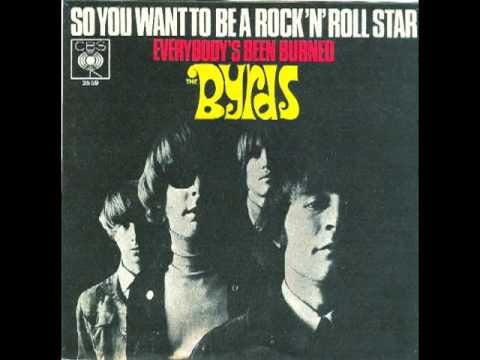Last week’s Bonus Round: "So You Want to Be a Rock 'n' Roll Star" is a song by the American rock band the Byrds, written by Jim McGuinn [aka Roger McGuinn] and Chris Hillman and included on the band's 1967 album, Younger Than Yesterday.[1] The song was inspired by the manufactured nature of the Monkees and was released as a single on January 9, 1967, reaching number 29 on the Billboard Hot 100, but failing to chart in the United Kingdom.[2][3]
Written in late 1966,[4] "So You Want to be a Rock 'n' Roll Star" has been described by Byrds expert Tim Conners as "an acerbic, but good-natured swipe at the success of manufactured rock bands like the Monkees."[5] …The manufactured nature of the group caused the Byrds' bassist, Chris Hillman, and lead guitarist, Jim McGuinn, to look upon the current state of the pop world with more than a little cynicism—something that was reflected in the song's lyrics.[6] Credit: Wikipedia
We talked last week about conversations with a producer/engineer/studio about what to expect, such as costs and so forth but there are a number of other things to consider. Will you be playing solo, for instance and separately recording vocals or both together? If your song will sound great with just your guitar and vocals, great! But if you don’t already play as part of a band or regular group you jam or collaborate with, or for whatever reason they’re not available or willing to record with you, then what? If you need a fuller sound with a bass guitar, drums, keyboards and maybe more, you may need, through your contacts or your recording studio or audio engineer, to locate and pay studio musicians “on spec” - to augment your recording session.
Paying session musicians for overdubs (recording their parts separately over your vocal/instrumental tracks) is one answer. Recording live in the studio with several musicians all playing together is another. A mixture of both techniques is also a possibility - playing with some of the backing instrumental musicians in the studio while others come in or otherwise separately record for overdubs. Any of these options have advantages and drawbacks.
Playing with all the instruments live in the studio together may make for a more natural live sound and the creative sparks between musicians can add to a vibe that will shine through on the final master. On the other hand, unless you spend some of your studio time rehearsing (while the money ticker is running), you may spend more time on successive takes if one or more musicians make mistakes or need to make changes to your arrangement (including you) - again, the money ticker is running! Often session musicians will be experienced, professional musicians who play locally or write, perform and record their own music, either individually or as part of a band (or bands) they already play in. In that case, their ability to sight read and play with very little rehearsal can be a real advantage in terms of time in the studio and professional results. Their talents are not cheap and you should be prepared to pay for professional quality results, which may have the benefit of helping reduce studio time costs and let your audio engineer work faster with better quality tracks from the start of the mastering process.
Chances are good your studio engineer may already know and have worked with many musicians who are capable of quality, professional performances with little rehearsal time needed. A good plan is to seek the best and most experienced recording musicians available in your area through your engineer/producer’s contacts and familiarity with these folks. And don’t quibble about price, though you do have reason to expect session musicians to live up to the recommendation. As we talked about last week, ensure you’re living up to the same expectations of arriving on time, rehearsed and prepared and performing at your best as well.
One final note - Rearranging a song you’ve previously copyrighted won’t affect your copyright. As the copyright holder, you have the prerogative to rearrange your songs as you like without endangering your composer or publisher copyrights, so feel free to take suggestions from those professionals you’re paying to record with you - the end result may not be quite what you envisioned, but likely will be even better!
Bonus Round: Some new basement tapes might help…
Cheers and keep playing!!
Michael Acoustic





